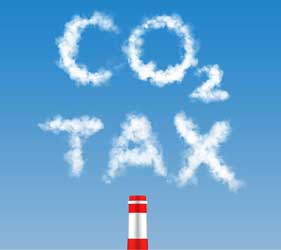U.S. Representatives Steve Scalise (R-La.) and David B. McKinley, P.E. (R-W.Va.) introduced a resolution that, if passed, would express the sense of Congress that a carbon tax would be detrimental to the United States economy and harm working-class Americans the most.
This is self-evidently true. In fact, it is so obviously true, a reasonable person might ask why such a resolution is even necessary. Do we really need a resolution that is as obvious as the sun rises in the east?
Sadly, even though the resolution’s point — that carbon taxes are harmful — is painfully obvious, the resolution is necessary. There are many voices on the national stage that support virtually any new tax and particularly any energy tax. The Biden administration has made it clear it considers the energy sector the enemy — killing pipelines, proposing new taxes, and advocating for new burdensome regulatory regimes and mandates. But this is counterproductive!
A carbon tax — no matter who they tell you will pay it — will hit the economy hard and will hit lower-income Americans the hardest. A carbon tax would increase the cost of everything Americans buy — from groceries, to electricity and gasoline, to home heating in the winter, to everyday household products. Moreover, having a reliable source of affordable energy is foundational to a strong job market and strong economic growth. The rich don’t need a strong job market or strong economic growth to build a better future for themselves and their families. They’ve already got that. But the working middle class and the working poor need a robust jobs market and economic growth to push wages higher.
The additional costs imposed on the working class by a carbon tax are difficult to bear. Their budgets are already tight. Are they going to go to work less often or heat their home less in the winter? They are kind of stuck. If you increase their energy costs, they have to give up other necessities. And if you damage the economy, their hope for better times and brighter days ahead evaporates. That’s way too high a price to pay for whatever false promises the elites are offering.
America achieved energy independence when only a few short years ago, it was widely perceived that we would always be forced to import energy and rely upon energy from hostile nations. Energy independence had obvious economic benefits, but it also had national security benefits. For much of the last two generations, American foreign policy had to worry about keeping the oil flowing from the Middle East. Given the volatility of the region, that often forced some unpleasant foreign policy considerations on American policymakers. But with energy independence, hostile powers could no longer hold us hostage or use energy as a leverage point. Thus, we were more secure. A carbon tax would put all of this at risk.
Some privileged elites see their support for a carbon tax as some sort of virtue. And they think it makes them look good. But what is there to feel so superior about in forcing working-class Americans to pay higher energy bills, transportation costs, and higher costs for food and household items — all while also being forced to suffer lower or suppressed wages?
This resolution tells Congress and the Biden administration that Americans expect accountability in their government. The Biden Administration is attacking energy through its attempts to force us into expensive electric vehicles and to use legitimate infrastructure needs as cover for redistributing taxpayer money to favored technologies like windmills and solar panels. This is all reminiscent of Solyndra, which gave away hundreds of millions of taxpayer dollars to well-heeled political donors in the guise of energy policy but was ultimately a boondoggle and nothing more.
Rather than trying to use energy policy as a way to push Americans into the buying preferences of a few political elites, let’s unleash the power of the free market and human creativity! We can have reliable, affordable energy and a clean environment. But only if we allow and encourage innovation, rather than imposing government mandates and taxes.

